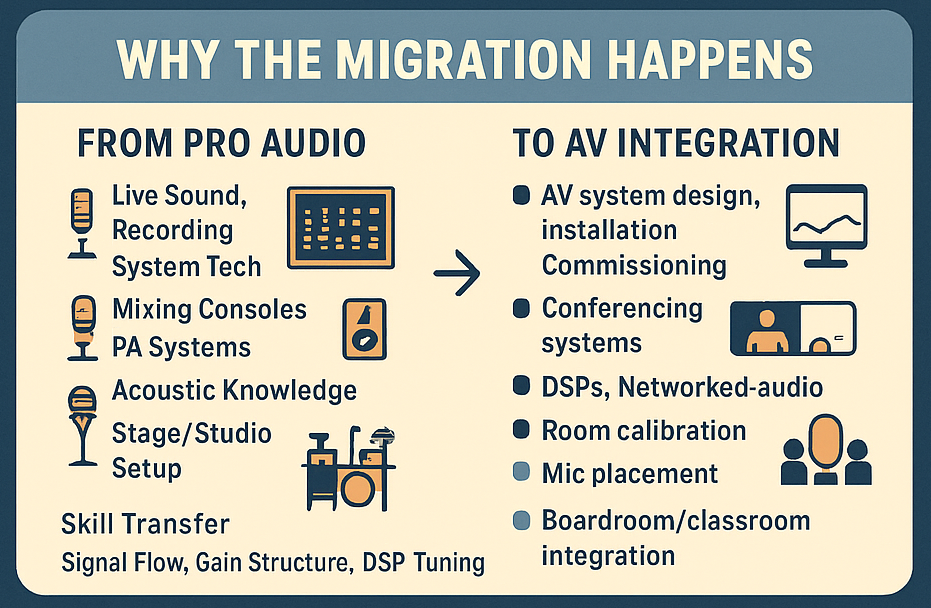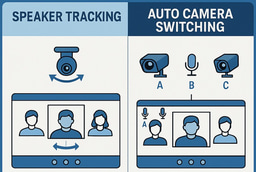An overview with examples, roles, and reasoning
Audio Engineers Who Migrated to the AV Integration Industry'
1. Why the Migration Happens
| From Pro Audio |
To AV Integration |
Skill Transfer |
| Live Sound, Recording, System Tech |
AV System Design, Installation, Commissioning |
Signal Flow, Gain Structure, DSP Tuning |
| Mixing Consoles, PA Systems |
Conferencing Systems, DSPs, Networked Audio |
EQ, Routing, Delay Alignment |
| Acoustic Knowledge |
Room Calibration, Mic Placement |
Acoustic Treatment, Speech Intelligibility |
| Stage/Studio Setup |
Boardroom/Classroom Integration |
Rack Wiring, Cable Management |
2. Notable Examples / Common Career Paths
| Background |
Migrated Role |
Typical Employers |
| FOH / Monitor Engineer |
AV Systems Designer or Commissioning Engineer |
AVSI, Diversified, AVI-SPL, Electrosonic |
| Studio Engineer |
DSP Programmer / Control Systems Engineer |
Corporate IT/AV, Crestron/Biamp integrators |
| Broadcast Audio Engineer |
AV Network Specialist / Streaming Engineer |
Universities, Government, Enterprise |
| Live System Tech |
Field Installation / Commissioning Lead |
AV Contractors, AV OEM Tech Teams |
3. Core Technologies Bridging Both Worlds
-
Dante / AES67 / AVB → Audio-over-IP standardization
-
DSP Platforms: Biamp Tesira, Q-SYS, BSS, Symetrix
-
Control Systems: Crestron, AMX, Extron
-
Network Management: VLANs, QoS, PoE+ design
-
Room Acoustics & Tuning: Using tools like SMAART, REW, EASERA
-
AV over IP & UC Integration: Zoom, Teams Rooms, NDI, etc.
4. Advantages Audio Engineers Bring
-
Deep understanding of sound quality and psychoacoustics
-
Strong troubleshooting & signal flow mindset
-
Experience in real-world audio environments (live/studio)
-
Comfort with high-pressure, on-site technical work
-
Ability to communicate between creative and IT teams
5. Skills They Usually Upskill On
| Area |
Tools / Platforms to Learn |
| AV Control |
Crestron, Extron, Q-SYS, AMX |
| Network Audio |
Dante, VLAN, Switch Config |
| Video Systems |
HDMI/HDBaseT, AV over IP |
| System Documentation |
AutoCAD, D-Tools, Visio |
| Commissioning |
Gain structure, Acoustic alignment, Metering |
6. Industry Outlook
The AV Industry is increasingly network-based, blending Audio + Video + Control + IT, so audio engineers with adaptability and curiosity have a fast-growth advantage. Platform like @AVIXA can bring this talent out with industry standard practices.







Please sign in or register for FREE
If you are a registered user on AVIXA Xchange, please sign in